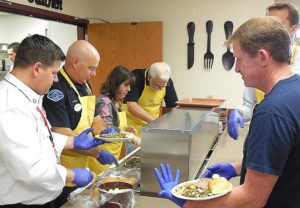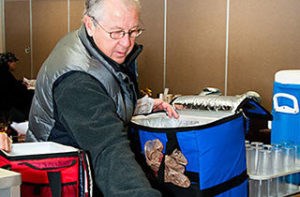This content was originally published by the Longmont Observer and is licensed under a Creative Commons license.
There are some essentials in life that most of us would struggle to do without. A roof over our head, a bed to sleep in each night, hot food and some human contact every day. Many of Longmont's disabled and senior residents have the first two covered but can't always manage to make themselves a meal and often go days without seeing another person. That's where Longmont's Meals on Wheels comes in.

With their team of around 500 volunteers and 9 paid full time and part time staff, Meals on Wheels have been a lifeline for now around 1000 residents in Longmont since 1969. They work hard throughout the week to provide hot, nutritious meals and a daily check to older adults and people with disabilities that reside in the communities of Longmont and Niwot. They also serve seniors over the age of 55 for lunch during the week at the Park View Cafe located in the Senior Center.
The daily check can be as bigger part of the service as the meal. Longmont Meals on Wheels delivers hot food to some of the most vulnerable residents in the community and this regular contact means the volunteer delivery drivers can be some of the first to notice if there is a problem. The Longmont Observer interviewed Katie Wiser, Development Coordinator for Meals on Wheels, who talked about one of their new schemes run in partnership with Longmont Fire Department, developed to help in an emergency situation.
"We started a new program last year called Lock Box. The laws changed at the end of 2015 and Colorado Police officers can no longer look through windows. We have a very specific system in place for volunteers. We are more than a meal, our primary focus is nutrition for seniors but when our volunteers deliver the meal they don't just ding-dong-ditch. They pay attention for things that don't look right."

Katie went on to explain the organizations protocol if a volunteer is concerned about a client. Occasionally the person receiving meals may forget to cancel the delivery if they are being taken out for lunch or might not hear the door bell and so, after waiting, they will leave the meal outside but other time the volunteer may notice newspapers piling up or other signs that something is not right. The first step for the organisation when there is a concern is to try and phone the client. If there is no answer they will then call their emergency contact, then the local hospitals and then finally they will call 911 and request a wellness visit.
"We had been doing the wellness visits jointly and the Police would knock on the door, try to get the door open, knock on windows, look around. It's been a long time since this happened but worst case scenario, the fire department might get the door down and get in. That happens very rarely. The law changed and they were no longer even allowed to look in the windows. They weren't even allowed to see if the door was unlocked, there was nothing they were allowed to do and they needed probable cause. Probable cause did not include meals and newspapers piling up, blaring TV at all hours of the day, that didn't count. Basically, probable cause is if they miss their rent, miss their mortgage, if there was an odour. That was really upsetting to us and we think that about five clients at the time of the change in the law were passed or were already deceased when volunteers arrived."
Katie then went on to explain how the organisation, and particularly their Executive Director Karla Hale, worked tirelessly to find a way around the new problem. They held discussions with the local Police Department, the City Manager, the City Attorney and finally when speaking to the Longmont Fire Department they came up with the plan that if they could provide coded lock boxes outside clients homes containing a door key, the Fire Department would be able to carry the code with them along with signed permission from the client to use it to enter the home.
Longmont Meals on Wheels had lock boxes donated to them by local realtor Wendy Conder and the Fire Department fit the boxes so this is a service that is now provided for free to Longmont residents who live alone that are 65 and older or who are disabled and/or suffer from major medical issues at any age.

Katie says the new lock box program is working really well and they have already had one case where it saved a life. The Boulder County District Attorney's Office and Adult Protective Services agree that the scheme is a brilliant idea and awarded Meals on Wheels Executive Director, Karla Hale a 2017 Boulder County Elder Abuse Awareness Day Award for all the hard work she put into getting the scheme off the ground.
Longmont Meals on Wheels receives no federal or state funding and relies heavily on financial contributions from donors and on the time donated by volunteers. To volunteer for Meals on Wheels, you just need to fill out an application (found on the website) and complete a background check. Groups or corporations can also volunteer collectively, switching off shifts between people. You can find out more about donating your time or money on their website or Facebook page.


